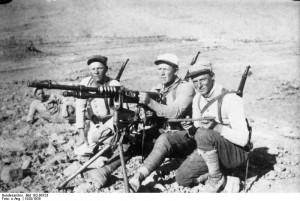The following is the generally accepted definitions of a mercenary.

These are the ones you’ll be judged by should you be caught fighting as a mercenary.
United Nations:
From the International Convention against the Recruitment, Use, Financing and Training of Mercenaries. It entered into force on 20 October 2001 and is usually known as the UN Mercenary Convention.
Definition of a mercenary
Article 1 of the Convention has the following definition of a mercenary:
1. A mercenary is any person who:
- (a) Is specially recruited locally or abroad in order to fight in an armed conflict;
- (b) Is motivated to take part in the hostilities essentially by the desire for private gain and, in fact, is promised, by or on behalf of a party to the conflict, material compensation substantially in excess of that promised or paid to combatants of similar rank and functions in the armed forces of that party;
- (c) Is neither a national of a party to the conflict nor a resident of territory controlled by a party to the conflict;
- (d) Is not a member of the armed forces of a party to the conflict; and
- (e) Has not been sent by a State which is not a party to the conflict on official duty as a member of its armed forces.
2. A mercenary is also any person who, in any other situation:
- (a) Is specially recruited locally or abroad for the purpose of participating in a concerted act of violence aimed at:
- (i) Overthrowing a Government or otherwise undermining the constitutional order of a State; or
- (ii) Undermining the territorial integrity of a State;
- (b) Is motivated to take part therein essentially by the desire for significant private gain and is prompted by the promise or payment of material compensation;
- (c) Is neither a national nor a resident of the State against which such an act is directed;
- (d) Has not been sent by a State on official duty; and
- (e) Is not a member of the armed forces of the State on whose territory the act is undertaken.
— UN Mercenary Convention[1]
From the Protocol Additional GC 1977 (APGC77):
The Protocol Additional GC 1977 (APGC77) provides the most widely accepted international definition of a mercenary, though not endorsed by some countries, including the United States. The Protocol Additional to the Geneva Conventions of 12 August 1949, and relating to the Protection of Victims of International Armed Conflicts, (Protocol I), 8 June 1977 states:
Art 47. Mercenaries
- 1. A mercenary shall not have the right to be a combatant or a prisoner of war.
- 2. A mercenary is any person who:
- (a) is especially recruited locally or abroad in order to fight in an armed conflict;
- (b) does, in fact, take a direct part in the hostilities;
- (c) is motivated to take part in the hostilities essentially by the desire for private gain and, in fact, is promised, by or on behalf of a Party to the conflict, material compensation substantially in excess of that promised or paid to combatants of similar ranks and functions in the armed forces of that Party;
- (d) is neither a national of a Party to the conflict nor a resident of territory controlled by a Party to the conflict;
- (e) is not a member of the armed forces of a Party to the conflict; and
- (f) has not been sent by a State which is not a Party to the conflict on official duty as a member of its armed forces.
It’s extremely important to note that all of the above criteria must be met in order for you to be ruled a mercenary, or “unlawful combatant”.
Unlawful Combatants, Mercenaries:
Under Article 47 of Protocol I (Additional to the Geneva Conventions of 12 August 1949, and relating to the Protection of Victims of International Armed Conflicts) it is stated in the first sentence “Amercenary shall not have the right to be a combatant or a prisoner of war.”
On 4 December 1989 the United Nations passed resolution 44/34 the International Convention against the Recruitment, Use, Financing and Training of Mercenaries. It entered into force on 20 October 2001 and is usually known as the UN Mercenary Convention.[20] Article 2 makes it an offence to employ a mercenary and Article 3.1 states that “A mercenary, as defined in article 1 of the present Convention, who participates directly in hostilities or in a concerted act of violence, as the case may be, commits an offence for the purposes of the Convention.”[21]
Some text retrieved/adapted from Wikipedia, the free online encyclopedia.
